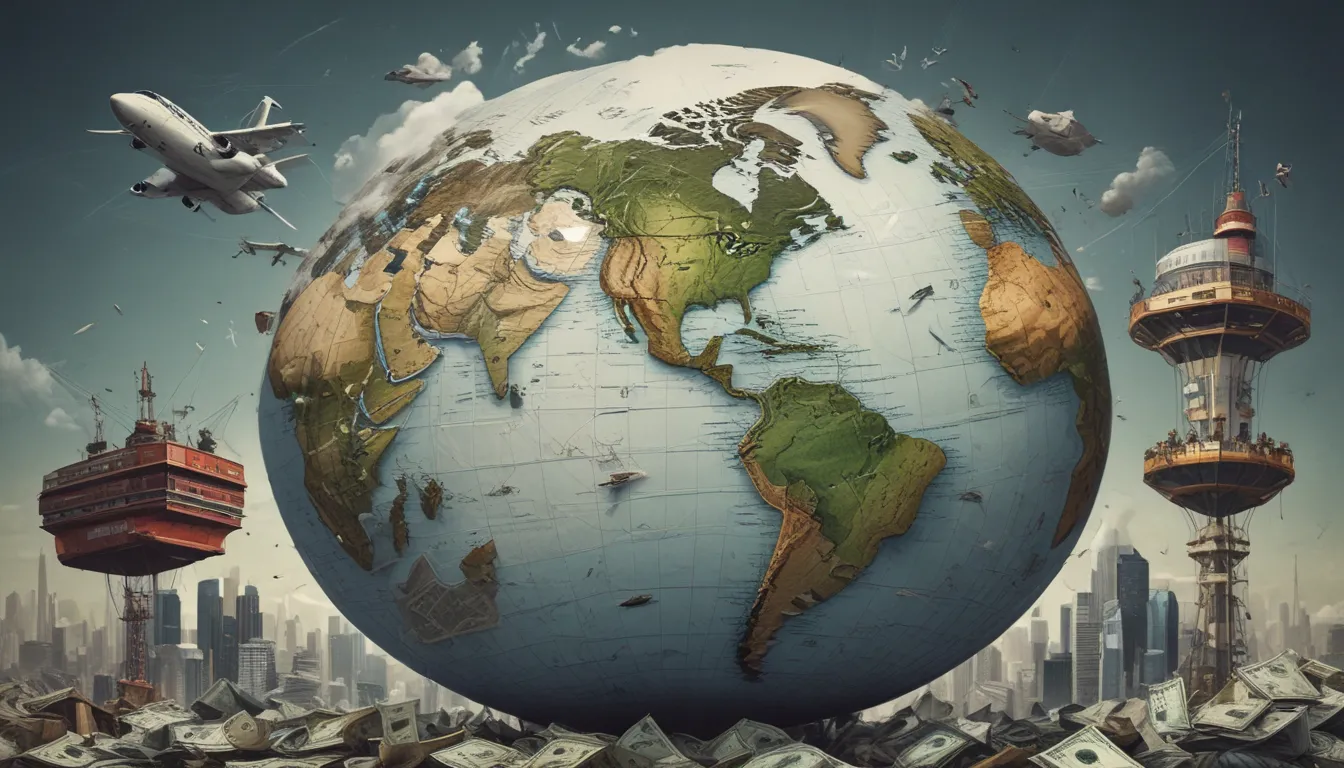A Note About Images: The images used in our articles are for illustration purposes only and may not exactly match the content. They are meant to engage readers, but the text should be relied upon for accurate information.
In today’s interconnected world, economic globalization is a driving force that shapes our economies, businesses, and societies. It has transformed the way countries interact with each other, leading to the exchange of goods, services, and information across borders. While many of us are familiar with the concept of globalization, there are still some surprising facts that may not be widely known. In this article, we will delve into 10 intriguing facts about economic globalization that will enhance our understanding of this complex and dynamic process. From the ancient origins of globalization to the impact of technology and multinational corporations, these facts shed light on the far-reaching effects of globalization and its implications for the future. So, let’s embark on this journey to uncover the unexpected facets of economic globalization.
Understanding Economic Globalization
Contrary to popular belief, economic globalization is not a new phenomenon. It has roots that can be traced back to the ancient Silk Road, where trade and cultural exchange flourished between different civilizations. This historical context highlights the long-standing nature of globalization and its enduring impact on the world.
The Power of International Supply Chains
Over 80% of the world trade is conducted through international supply chains. This intricate network of production and distribution is a vital component of global trade, ensuring that products pass through multiple countries before reaching the end consumer. The reliance on international supply chains underscores the interconnected nature of the global economy.
China’s Dominance in International Trade
China has emerged as the largest trading nation in the world, surpassing the United States. With its vast manufacturing sector and expanding consumer market, China plays a pivotal role in driving international trade and shaping the global economy. This shift in economic power highlights the evolving dynamics of the global marketplace.
The Rise of Foreign Direct Investment
Economic globalization has led to a significant increase in foreign direct investment (FDI). Companies now have the opportunity to invest in foreign markets, creating job opportunities, fostering innovation, and fueling economic growth. The surge in FDI underscores the interconnected nature of the global economy and the role of multinational corporations in driving international investment.
The Influence of Technological Advancements
Technological advancements have accelerated economic globalization, making it easier for businesses to operate on a global scale. Online platforms, e-commerce, and digital payment systems have revolutionized the way international trade is conducted, facilitating seamless transactions and communication across borders. The digital revolution has transformed the landscape of global commerce, enabling businesses to thrive in an increasingly interconnected world.
The Role of the World Trade Organization
The World Trade Organization (WTO) plays a crucial role in regulating global trade. Established in 1995, the WTO sets the rules for international trade, resolves disputes between nations, and promotes fair and open trade practices. The presence of the WTO ensures a level playing field for countries engaging in global trade, fostering transparency and cooperation among nations.
The Impact on Global Poverty
Economic globalization has played a significant role in reducing global poverty. By opening up markets and creating trade opportunities, globalization has helped lift millions of people out of poverty, particularly in developing countries. The economic opportunities created by globalization have contributed to improving living standards and enhancing economic development on a global scale.
Addressing Income Inequality
While economic globalization has brought about numerous benefits, it has also widened income inequality and created disparities between nations. The winners and losers of globalization are often unevenly distributed, leading to concerns about social inequity and economic disparity. Addressing income inequality is a key challenge in maximizing the positive impact of economic globalization and promoting inclusive growth.
The Influence of Tourism
Tourism plays a significant role in economic globalization, contributing to the growth of the global economy through travel, cultural exchange, and economic activity. Visiting new destinations, experiencing diverse cultures, and supporting local industries all contribute to the interconnectedness of the global marketplace. The tourism industry serves as a driving force in promoting international cooperation and economic growth.
The Impact on Cultural Diversity
Globalization has led to a homogenization of cultures, as people from different regions are exposed to similar products and ideas. This cultural convergence raises concerns about the preservation of unique traditions and identities in the face of global integration. While globalization fosters cultural exchange and cross-cultural understanding, it also raises questions about the preservation of cultural diversity in an increasingly interconnected world.
Embracing Global Cooperation
Foreign aid and humanitarian efforts are interconnected with economic globalization, enabling countries to provide support and assistance to those in need. Through global cooperation, nations can address shared challenges and work together to create a more sustainable and inclusive world. The interconnected nature of economic globalization underscores the importance of collective action in tackling global issues and promoting social progress.
Navigating Sustainability Challenges
Economic globalization has sparked debates on sustainability and environmental conservation. The increased production and consumption associated with globalization have placed strains on natural resources and raised concerns about the long-term impact on the environment. Addressing sustainability challenges is essential in ensuring the responsible stewardship of our planet and fostering a harmonious relationship between economic development and environmental preservation.
Adapting to the Impacts of the COVID-19 Pandemic
The COVID-19 pandemic has significantly impacted economic globalization, disrupting global supply chains, highlighting vulnerabilities in certain industries, and underscoring the importance of resilient and inclusive global systems. The pandemic has reshaped the way we engage in economic activities and emphasized the need for flexibility, adaptability, and cooperation in navigating unprecedented challenges.
Conclusion: Embracing the Opportunities of Economic Globalization
In conclusion, economic globalization has reshaped our world, influencing the way we conduct business, interact with one another, and address global challenges. The 10 surprising facts about economic globalization presented in this article offer insights into the multifaceted nature of this phenomenon, highlighting both the opportunities and challenges it brings. From the transformative power of technology to the interconnectedness of global markets, economic globalization has the potential to drive economic growth and development on a global scale. By understanding the complexities of economic globalization and engaging in informed discussions, we can work towards harnessing its benefits while addressing its limitations.
Join Us in Exploring Economic Globalization
Our commitment to delivering trustworthy and engaging content is evident in the diverse insights and information contributed by real users like you. Each fact on our site undergoes a meticulous review process by our dedicated editors to ensure accuracy and reliability. Explore and learn with us as we continue to uncover the fascinating aspects of economic globalization and its impact on our world.
FAQs
- What is economic globalization?
-
Economic globalization refers to the increasing interdependence and integration of national economies through the flow of goods, services, capital, and information across borders.
-
How does economic globalization impact employment?
-
Economic globalization can lead to job creation and access to new markets, as well as job displacement and increased competition in certain industries.
-
Does economic globalization contribute to income inequality?
-
Economic globalization can exacerbate income inequality by benefiting some individuals and regions more than others. However, it also offers avenues for economic growth and poverty reduction.
-
What are the benefits of economic globalization?
-
Benefits of economic globalization include increased trade, technological advancements, access to a wider variety of goods and services, and potential economic growth and development.
-
What are the potential drawbacks of economic globalization?
-
Potential drawbacks of economic globalization include job displacement, environmental degradation, social inequality, and the erosion of local cultures and traditions.
-
How does economic globalization impact the environment?
-
Economic globalization can have negative impacts on the environment, such as increased carbon emissions and resource depletion. However, it also presents opportunities for global cooperation and sustainable development.
-
Can economic globalization be regulated?
-
Economic globalization can be regulated through international agreements, trade policies, and domestic regulations. Finding the right balance between openness and protectionism remains a complex task.
-
What role does technology play in economic globalization?
-
Technology plays a crucial role in facilitating economic globalization by enabling rapid information exchange, communication, and global supply chain integration.
-
How does economic globalization impact cultural diversity?
-
Economic globalization can impact cultural diversity by promoting the spread of dominant cultural norms and homogenizing certain aspects of culture. However, it also creates opportunities for cultural exchange and appreciation.
-
What is the future of economic globalization?
- The future of economic globalization remains uncertain, with ongoing debates on the extent of globalization and the balance between global cooperation and national interests. Economic interdependence is likely to continue shaping our world.
As we continue to navigate the ever-evolving landscape of economic globalization, let us embrace the opportunities it presents while acknowledging the challenges it poses. By working together and fostering informed dialogue, we can shape a future where economic globalization benefits all members of the global community. Join us in exploring the dynamic world of economic globalization and its transformative impact on our interconnected world.






